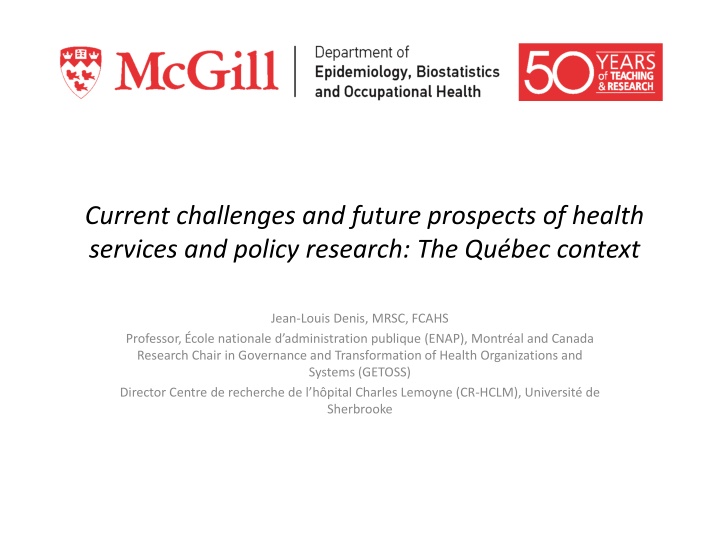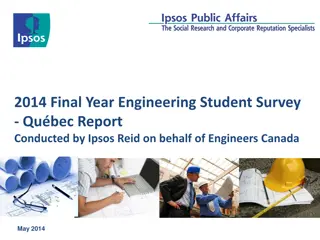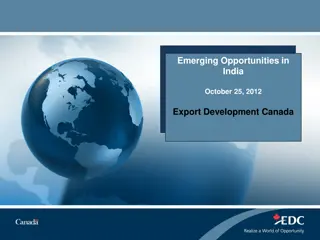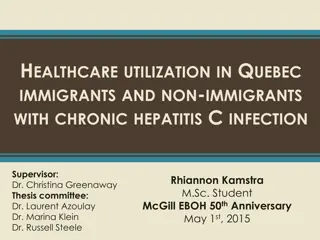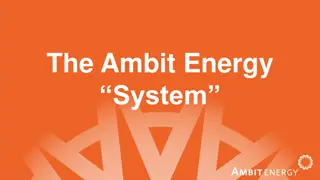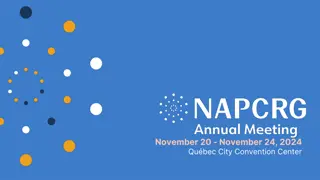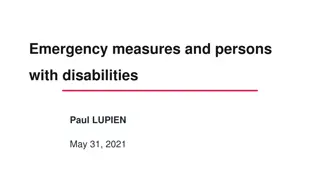Challenges and Prospects of Health Services in Quebec
In the Quebec context, current challenges and future prospects of health services and policy research are explored. Process and practice-based research are highlighted for transforming healthcare systems. The significance of process studies and the concept of practice in healthcare are discussed, along with an example study on healthcare reform implementation in Quebec. A model illustrating different forms of institutional work in policy reform enactment is also presented, shedding light on the impact of contradictions between policy proposals and existing practices.
Download Presentation

Please find below an Image/Link to download the presentation.
The content on the website is provided AS IS for your information and personal use only. It may not be sold, licensed, or shared on other websites without obtaining consent from the author.If you encounter any issues during the download, it is possible that the publisher has removed the file from their server.
You are allowed to download the files provided on this website for personal or commercial use, subject to the condition that they are used lawfully. All files are the property of their respective owners.
The content on the website is provided AS IS for your information and personal use only. It may not be sold, licensed, or shared on other websites without obtaining consent from the author.
E N D
Presentation Transcript
Current challenges and future prospects of health services and policy research: The Qu bec context Jean-Louis Denis, MRSC, FCAHS Professor, cole nationale d administration publique (ENAP), Montr al and Canada Research Chair in Governance and Transformation of Health Organizations and Systems (GETOSS) Director Centre de recherche de l h pital Charles Lemoyne (CR-HCLM), Universit de Sherbrooke
The value of process and practice- based research for the transformation and improvement of healthcare systems
process studies address questions about how and why things emerge, develop, grow, or terminate over time, as distinct from variance questions dealing with covariation among dependent and independent variables (Langley, Smallman, Tsoukas, & Van de Ven, 2013:1).
practice refers both to the situated doings of the individual human beings (micro) and to the different socially defined practices (macro) that the individuals are drawing upon in these doings . (Jarzabkowski, P., J. Balogun & D. Seidl. 2007. Strategizing: The challenges of a practice perspective . Human Relations, 2007, 60.1: 5-27).
Example of a study on the implementation of healthcare reform (the previous one!!) in Quebec (CSSS)
Figure 1: A Model of Forms of Institutional Work in the Enactment of Policy Reform (Cloutier, Denis, Langley, Lamothe, JPART, conditional acceptance) Precursive STRUCTURAL WORK Disruptive Recursive Constructing agency Constructing agency RELATIONAL WORK Push to the new Integrative Specialized Transactional Pull of the old CONCEPTUAL WORK OPERATIONAL WORK Contentious Fragmented Detached Repetitive
Our model provides a useful lens to explain how contradictions between novel policy proposals and pre-existing practices influence each form of work in distinctive ways, diluting its impact to different degrees while at the same time and paradoxically creating opportunities for its enactment. (Cloutier, Denis, Langley, Lamothe, JPART, conditional acceptance)
Prospects Full potential of process and practice-based research has not been sufficiently exploited. Some examples: to characterize the resources (skills, competencies, ) needed by health actors to contribute effectively to policy making and their strategies to develop, sustain and deploy policy capacity; realist evaluation of the introduction of financial incentives for organizations and providers (Greenhalgh & al., 2009) Combining process and outcomes research in a balanced way at the policy, organizational and clinical levels of health systems
Back to the Qubec context Developping more effective model to incorporate research in the development of transformative and improvement capacities within policy, organizational and clinical settings Organizing knowledge production resources in hybrid networks that combine researchers and practitioners Developing a companion research agenda to current reforms in Quebec Working (more!) across institutional boundaries
